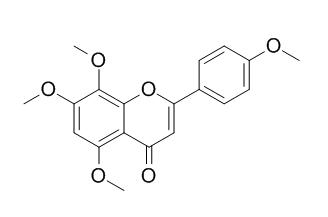6-Demethoxytangeretin
6-Demethoxytangeretin has anti-inflammatory activity, it also can suppress production and gene expression of interleukin-6 in human mast cell-1 via anaplastic lymphoma kinase and mitogen-activated protein kinase pathways. 6-Demethoxytangeretin can suppress the interleukin 1 (IL-1) induced production of proMMP-9/progelatinase B in rabbit synovial cells in a dose dependent manner (<64 microM).
Inquire / Order:
manager@chemfaces.com
Technical Inquiries:
service@chemfaces.com
Tel:
+86-27-84237783
Fax:
+86-27-84254680
Address:
1 Building, No. 83, CheCheng Rd., Wuhan Economic and Technological Development Zone, Wuhan, Hubei 430056, PRC
Providing storage is as stated on the product vial and the vial is kept tightly sealed, the product can be stored for up to
24 months(2-8C).
Wherever possible, you should prepare and use solutions on the same day. However, if you need to make up stock solutions in advance, we recommend that you store the solution as aliquots in tightly sealed vials at -20C. Generally, these will be useable for up to two weeks. Before use, and prior to opening the vial we recommend that you allow your product to equilibrate to room temperature for at least 1 hour.
Need more advice on solubility, usage and handling? Please email to: service@chemfaces.com
The packaging of the product may have turned upside down during transportation, resulting in the natural compounds adhering to the neck or cap of the vial. take the vial out of its packaging and gently shake to let the compounds fall to the bottom of the vial. for liquid products, centrifuge at 200-500 RPM to gather the liquid at the bottom of the vial. try to avoid loss or contamination during handling.
Phytomedicine.2019, 67:153159
Hanoi University of Pharmacy2023, 14(1):30-39.
Patanjali Research Foundation2024, ssrn.4807357
J Ginseng Res.2022, 46(1):104-114.
Anticancer Res.2018, 38(4):2127-2135
Asian J of Pharmaceutical&Clinical 2018, 11(2)
J Biomol Struct Dyn.2022, 5;1-17.
Korean J. Medicinal Crop Sci.2018, 26(2):148-156
Molecules.2023, 28(4):1785.
Food Chem.2023, 404(Pt A):134517.
Related and Featured Products
Biol Pharm Bull. 2013;36(10):1646-9.
6-demethoxynobiletin, a nobiletin-analog citrus flavonoid, enhances extracellular signal-regulated kinase phosphorylation in PC12D cells.[Pubmed:
23934345]
We previously demonstrated that nobiletin, a polymethoxylated flavone isolated from citrus peels, has the potential to improve cognitive dysfunction in patients with Alzheimer's disease (AD). Recent studies suggest that the generation of intraneuronal amyloid-beta (Aβ) oligomers is an early event in the pathogenesis of AD. Aβ oligomers cause deficits in the regulation of the extracellular signal-regulated kinase (ERK) signaling which is critical for consolidation of the memory. Our previous studies revealed that nobiletin activated ERK signaling and subsequent cyclic AMP response element-dependent transcription.
METHODS AND RESULTS:
In this study, the effects of five nobiletin analogs, 6-demethoxynobiletin, tangeretin, 5-demethylnobiletin, sinensetin, and 6-Demethoxytangeretin, isolated from citrus peels were assessed on ERK phosphorylation in PC12D cells, and the structure-activity relationships were examined. PC12D cells were treated with nobiletin or its analogs, and the cell extracts were analyzed by Western blotting using an antibody specific to phosphorylated ERK. 6-Demethoxynobiletin markedly enhanced ERK phosphorylation in a concentration-dependent manner.
CONCLUSIONS:
These results may be useful in developing drugs and functional foods using citrus peels for the treatment of dementia including AD.
J Rheumatol. 2000 Jan;27(1):20-5.
A citrus flavonoid, nobiletin, suppresses production and gene expression of matrix metalloproteinase 9/gelatinase B in rabbit synovial fibroblasts.[Pubmed:
10648013]
Flavonoids including nobiletin are known to exert many biological actions in vitro. We investigated the chondroprotective effect of citrus flavonoids, especially nobiletin, using cultured rabbit synovial fibroblasts and articular chondrocytes.
METHODS AND RESULTS:
We examined the effects of citrus flavonoids on the production and gene expression of matrix metalloproteinases (MMP) and prostaglandin E2 (PGE2)production in rabbit synovial fibroblasts.
Six flavonoids isolated from Citrus depressa Rutaceae including tangeretin, 6-Demethoxytangeretin, nobiletin, 5-demethylnobiletin, 6-demethoxynobiletin, and sinensetin suppressed the interleukin 1 (IL-1) induced production of proMMP-9/progelatinase B in rabbit synovial cells in a dose dependent manner (<64 microM); nobiletin most effectively suppressed proMMP-9 production along with the decrease in its mRNA. Nobiletin also reduced IL-1 induced production of PGE2 in the synovial cells, but did not modify the synthesis of total protein. These suppressive effects of nobiletin were also observed in rabbit articular chondrocytes. Nobiletin inhibited proliferation of rabbit synovial fibroblasts in the growth phase.
CONCLUSIONS:
These results suggest nobiletin is a novel antiinflammatory candidate that has the potential to inhibit PGE2 production, matrix degradation of the articular cartilage, and pannus formation in osteoarthritis and rheumatoid arthritis.
CONCLUSION:
These results suggest nobiletin is a novel antiinflammatory candidate that has the potential to inhibit PGE2 production, matrix degradation of the articular cartilage, and pannus formation in osteoarthritis and rheumatoid arthritis.
Biol Pharm Bull. 2014;37(5):871-6.
A citrus flavonoid, 6-demethoxytangeretin, suppresses production and gene expression of interleukin-6 in human mast cell-1 via anaplastic lymphoma kinase and mitogen-activated protein kinase pathways.[Pubmed:
24500009]
Citrus species has been traditionally used in Korea for the treatment of coughing, sputum and dyspepsia. Of the known citrus flavonoids, 6-Demethoxytangeretin was reported to exert anti-inflammatory activity.
METHODS AND RESULTS:
In order to determine the anti-allergic activity of 6-Demethoxytangeretin, we examined whether or not 6-Demethoxytangeretin was able to suppress activation of the human mast cell line, HMC-1, induced by phorbol 12-myristate 13-acetate (PMA) plus A23187. Interleukin-6 production and relevant gene expression in activated HMC-1 cells were determined by enzyme-linked immunosorbent assay (ELISA) and quantitative reverse transcription-polymerase chain reaction (RT-PCR) analysis. Also, the involvement of the anaplastic lymphoma kinase (ALK) and mitogen-activated protein kinases (MAPKs) in activated HMC-1 cells were studied. 6-Demethoxytangeretin suppresses interleukin-6 production, tumor necrosis factor-alpha gene expression, ALK and MAPKs in HMC-1 cells stimulated by PMA plus A23187.
CONCLUSIONS:
Therefore, it was evident that 6-Demethoxytangeretin suppressed activation of HMC-1 cells by PMA plus A23187 by inhibiting the activity of ALK and MAPKs and subsequently suppressing gene expression, which suggest that 6-Demethoxytangeretin may be involved in the regulation of mast cell-mediated inflammatory responses.



